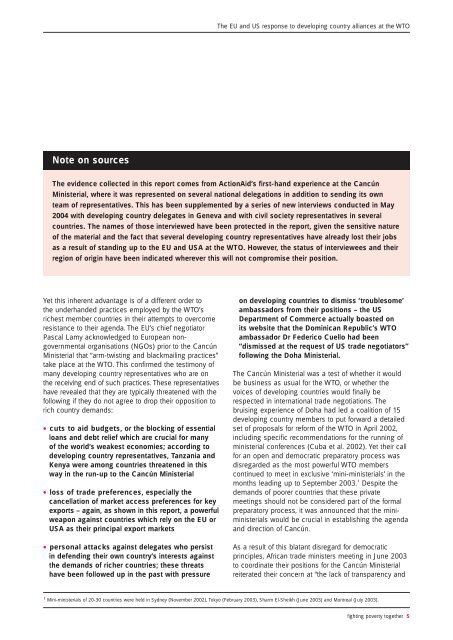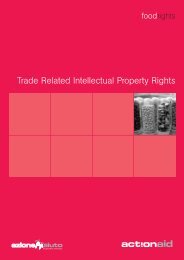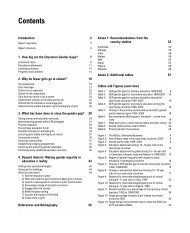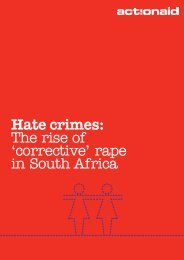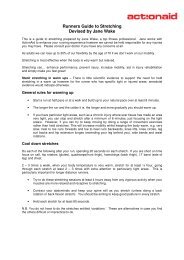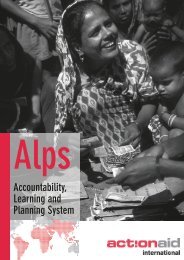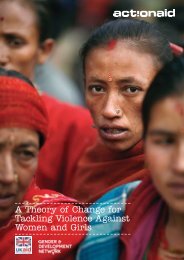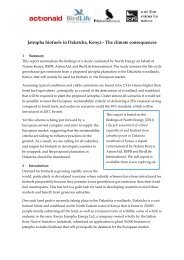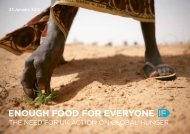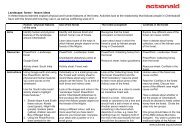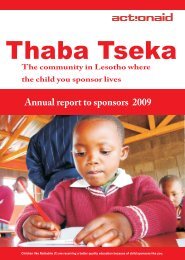Divide and Rule: - ActionAid
Divide and Rule: - ActionAid
Divide and Rule: - ActionAid
Create successful ePaper yourself
Turn your PDF publications into a flip-book with our unique Google optimized e-Paper software.
The EU <strong>and</strong> US response to developing country alliances at the WTONote on sourcesThe evidence collected in this report comes from <strong>ActionAid</strong>’s first-h<strong>and</strong> experience at the CancúnMinisterial, where it was represented on several national delegations in addition to sending its ownteam of representatives. This has been supplemented by a series of new interviews conducted in May2004 with developing country delegates in Geneva <strong>and</strong> with civil society representatives in severalcountries. The names of those interviewed have been protected in the report, given the sensitive natureof the material <strong>and</strong> the fact that several developing country representatives have already lost their jobsas a result of st<strong>and</strong>ing up to the EU <strong>and</strong> USA at the WTO. However, the status of interviewees <strong>and</strong> theirregion of origin have been indicated wherever this will not compromise their position.Yet this inherent advantage is of a different order tothe underh<strong>and</strong>ed practices employed by the WTO’srichest member countries in their attempts to overcomeresistance to their agenda. The EU’s chief negotiatorPascal Lamy acknowledged to European nongovernmentalorganisations (NGOs) prior to the CancúnMinisterial that “arm-twisting <strong>and</strong> blackmailing practices”take place at the WTO. This confirmed the testimony ofmany developing country representatives who are onthe receiving end of such practices. These representativeshave revealed that they are typically threatened with thefollowing if they do not agree to drop their opposition torich country dem<strong>and</strong>s:• cuts to aid budgets, or the blocking of essentialloans <strong>and</strong> debt relief which are crucial for manyof the world’s weakest economies; according todeveloping country representatives, Tanzania <strong>and</strong>Kenya were among countries threatened in thisway in the run-up to the Cancún Ministerial• loss of trade preferences, especially thecancellation of market access preferences for keyexports – again, as shown in this report, a powerfulweapon against countries which rely on the EU orUSA as their principal export markets• personal attacks against delegates who persistin defending their own country’s interests againstthe dem<strong>and</strong>s of richer countries; these threatshave been followed up in the past with pressureon developing countries to dismiss ‘troublesome’ambassadors from their positions – the USDepartment of Commerce actually boasted onits website that the Dominican Republic’s WTOambassador Dr Federico Cuello had been“dismissed at the request of US trade negotiators”following the Doha Ministerial.The Cancún Ministerial was a test of whether it wouldbe business as usual for the WTO, or whether thevoices of developing countries would finally berespected in international trade negotiations. Thebruising experience of Doha had led a coalition of 15developing country members to put forward a detailedset of proposals for reform of the WTO in April 2002,including specific recommendations for the running ofministerial conferences (Cuba et al. 2002). Yet their callfor an open <strong>and</strong> democratic preparatory process wasdisregarded as the most powerful WTO memberscontinued to meet in exclusive ‘mini-ministerials’ in themonths leading up to September 2003. 1 Despite thedem<strong>and</strong>s of poorer countries that these privatemeetings should not be considered part of the formalpreparatory process, it was announced that the miniministerialswould be crucial in establishing the agenda<strong>and</strong> direction of Cancún.As a result of this blatant disregard for democraticprinciples, African trade ministers meeting in June 2003to coordinate their positions for the Cancún Ministerialreiterated their concern at “the lack of transparency <strong>and</strong>1 Mini-ministerials of 20-30 countries were held in Sydney (November 2002), Tokyo (February 2003), Sharm El-Sheikh (June 2003) <strong>and</strong> Montreal (July 2003).fighting poverty together 5


